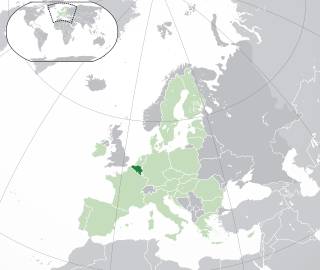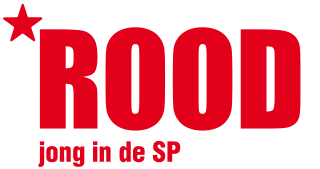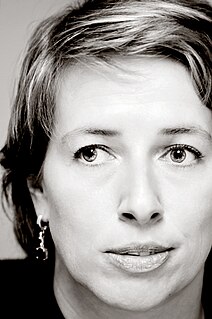
The politics of Belgium take place in the framework of a federal, representative democratic, constitutional monarchy. The King of the Belgians is the head of state, and the Prime Minister of Belgium is the head of government, in a multi-party system. Executive power is exercised by the government. Federal legislative power is vested in both the government and the two chambers of parliament, the Senate and the Chamber of Representatives. The federation is made up of (language-based) communities and (territorial) regions. Philippe is the seventh and current King of the Belgians, having ascended the throne on 21 July 2013.

Vlaams Blok was the name of a Belgian far-right and secessionist political party with an anti-immigration platform. Its ideologies embraced Flemish nationalism, calling for the independence of Flanders. The party originated from split within the Volksunie (VU) party after the right-wing separatist and national conservative wing became disgruntled with the compromise of accepting Belgian federalism over Flemish interests, and what they saw as the VU's move to the left. The former VU members created the Flemish National Party (VNP) and the Flemish People's Party (VVP) which formed an electoral alliance called Vlaams Blok in 1978, before merging to create Vlaams Blok as a political party in 1979. Vlaams Blok was the most notable militant right wing of the Flemish movement and its track record in the Flemish and Belgian parliament elections was strong, making it one of the most successful nationalist parties in Western Europe and it ultimately surpassed the People's Union in support. The party initially focused solely on the issues of Flemish autonomy and political freedom, which remained its core philosophy, but subsequently gained wider public support through broadening its campaigns to include immigration and law-and-order themes.

The Open Flemish Liberals and Democrats is a Flemish conservative-liberal political party in Belgium. The party was created in 1992 from the former Party for Freedom and Progress (PVV) and politicians from other parties. The party led the government for three cabinets under Guy Verhofstadt from 1999 until March 2008. Open VLD most recently formed the Federal Government with N-VA, CD&V and the Francophone Reformist Movement (MR).
Forward is a Flemish social democratic political party in Belgium. The party was known as the Flemish Socialist Party until 21 March 2021, when its current name was adopted.

Groen, founded as Agalev, is a green Flemish political party in Belgium. Its French-speaking equivalent is Ecolo; the two parties maintain close relations with each other.
Same-sex marriage in Belgium has been legal since 1 June 2003. A bill for legalization was passed by the Senate on 28 November 2002, and by the Chamber of Representatives on 30 January 2003. It entered into force on 1 June, after King Albert II gave his royal assent. Belgium became the second country in the world to legalise same-sex marriage, after the Netherlands. "Statutory cohabitation", open to any two legally consenting cohabiting persons, has been available since 1 January 2000.

Sociaal-Liberale Partij was a Belgian Flemish political party formed after dissolution of the moderate nationalist People's Union (Volksunie) party. Prior to 19 April 2008 it was known as Spirit, and intermediately as Flemish Progressives (VlaamsProgressieven). The party merged with Groen in the end of 2009, ceasing to exist.

Belgium is a federal state with a multi-party political system, with numerous parties who factually have no chance of gaining power alone, and therefore must work with each other to form coalition governments.

The Flemish Movement is an umbrella term which encompasses various political groups in the Belgian region of Flanders and, less commonly, in French Flanders. Ideologically, it encompasses groups which have sought to promote Flemish culture and Dutch language as well as those who have sought greater political autonomy for Flanders within Belgium. It also encompasses nationalists who have sought the secession of Flanders from Belgium, either through outright independence or unification with the Netherlands.

Young European Socialists (YES), formerly the European Community Organisation of Socialist Youth (ECOSY), is an association of social democratic youth organisations in Europe and the European Union.

Socialist Labour Party of Croatia is a communist party in Croatia, also known as Socialist Workers' Party of Croatia. It is considered to be one of the more authentically left-wing parties in Croatian politics. Their youth wing are the Young Socialists of Croatia.

Lesbian, gay, bisexual, transgender (LGBT) rights in Belgium are seen as some of the most progressive in Europe and in the world, though in recent years, they may face legal challenges not faced by non-LGBT residents. Same-sex sexual activity was legalised in 1795, with an equal age of consent, except from 1965 until 1985. After granting same-sex couples domestic partnership benefits in 2000, Belgium became the second country in the world to legalise same-sex marriage in 2003. Same-sex adoption was fully legalised in 2006 under the same terms and conditions as heterosexual adoption, and lesbian couples can access IVF as well. Protections from discrimination based on sexual orientation in employment, housing, and public and private accommodations were enacted in 2003 and on gender identity and expression in 2014. Transgender people have been allowed to change their legal gender since 2007, though under certain circumstances which were repealed in 2018.
The National Alliance was a Dutch ultranationalist political party. It was disbanded in 2007.

ROOD, jong in de SP is a Dutch political youth wing connected to the left-wing Socialist Party.

Daniël Termont is a Belgian politician, member of the Socialist Party and former mayor of Ghent, Belgium. He was the son of shopkeepers who lived in Mariakerke. His mother's family was strongly socialistically engaged. In 1971, Daniel obtained a degree in accounting at the Stedelijk Instituut voor Handel en Secretariaat. He did his military service as from April 1972 until April 1973 and worked later on for ten years as a federal charge of LTA, the youth organization of the Socialist Unions at that time. Until 1980 he was also an information officer at the East Flemish Division in the area Ghent-Eeklo. He has been elected to the city council since 1976. Later on, from 1983 until 1988, he was also director of De Ceder holiday centre in Deinze. He was the first director of the centre after a renovation which followed after many years of decline of the institution. Subsequently, from 1988 to 1995, he was secretary-treasurer of Bond Moyson, the year he took his first full-time political office as a councilor in Ghent. From 1995 until 2006, he was alderman of the harbour. Between 2001 and 2006 he was also alderman of festivities.

Caroline Gennez is a Belgian socialist politician and a former chairwoman of the Socialist Party – Different (SP.A) in Flanders.

The Movement of the Young Socialists or simply Jeunes Socialistes is the youth organisation of the Socialist Party of France.
Pillarisation is the politico-denominational segregation of a society, or the separation of a society into groups by religion and associated political beliefs. These societies were "vertically" divided into two or more groups known as pillars. The best-known examples of this have historically occurred in the Netherlands and Belgium.
Anarchism in the Netherlands originated in the second half of the 19th century. Its roots lay in the radical and revolutionary ideologies of the labor movement, in anti-authoritarian socialism, the free thinkers and in numerous associations and organizations striving for a libertarian form of society. During the First World War, individuals and groups of syndicalists and anarchists of various currents worked together for conscientious objection and against government policies. The common resistance was directed against imperialism and militarism.













